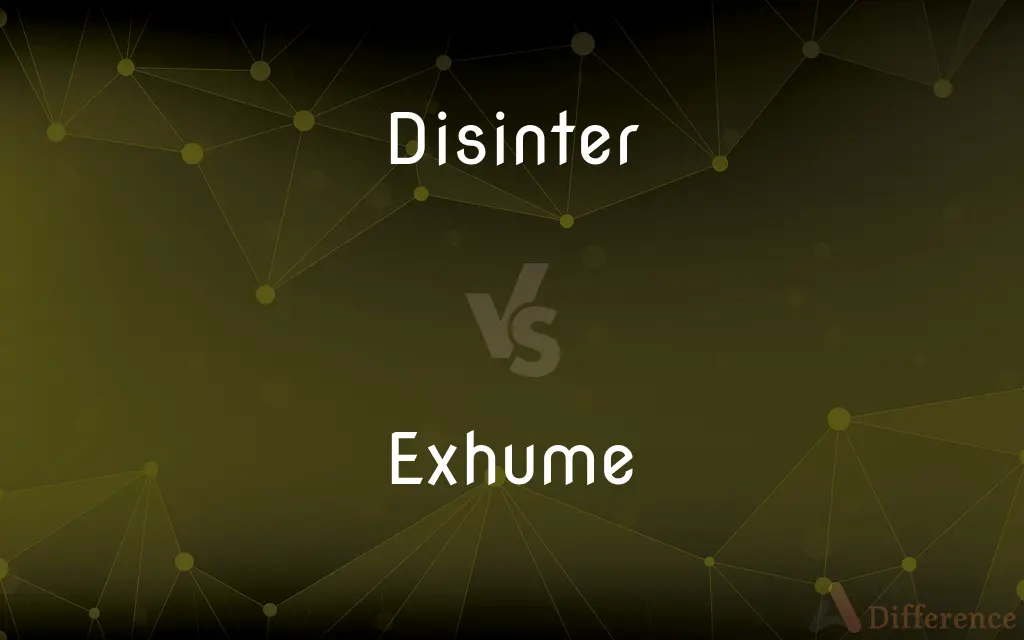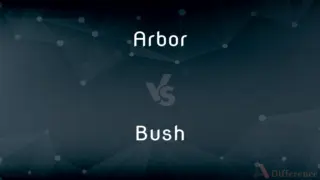Disinter vs. Exhume — What's the Difference?
By Tayyaba Rehman & Urooj Arif — Updated on April 1, 2024
Disinter and exhume both refer to the act of digging up something buried, typically a body, but exhume is often used in legal or investigative contexts.

Difference Between Disinter and Exhume
Table of Contents
ADVERTISEMENT
Key Differences
Disinter generally means to take out something that has been buried, especially a dead body, from the ground. The term does not inherently carry any specific legal or scientific connotation but rather describes the action itself. Exhume, on the other hand, is specifically used in contexts that involve removing a body from its burial place for legal, scientific, or investigative purposes. It often implies a formal process, possibly under legal authority, to uncover evidence or for forensic analysis.
While disinter can be used in a broader sense, applicable to both the act of unearthing objects and human remains without any particular context, exhume is more narrowly defined. Exhume usually suggests a purpose beyond merely retrieving the body, such as conducting an autopsy, reburial, or examination for historical research. This specificity highlights the procedural and often sensitive nature of the action, distinguishing it from the more general act of disinterment.
The usage of disinter might be found in historical, archaeological, or literary contexts, implying the removal of objects, artifacts, or remains from burial sites or locations where they have been placed out of respect, memory, or preservation. Exhume, conversely, is frequently associated with legal investigations, criminal cases, or historical inquiries where the body's condition and the cause of death might provide critical information or resolve unanswered questions.
Both terms involve complex emotional and cultural considerations, recognizing the significance of disturbing final resting places. However, the act of exhuming often entails a higher level of scrutiny and justification due to its invasive nature and the potential implications of the findings. This process is usually regulated by specific laws and ethical guidelines to ensure respect for the deceased and their families.
In literature or colloquial speech, disinter can also metaphorically refer to bringing back into focus something that was forgotten or ignored, such as disinterring old controversies or memories. Exhume, while less commonly used metaphorically, can carry a similar connotation when referring to the act of bringing hidden or suppressed information to light, though with a nuance of uncovering something with significant effort or under extraordinary circumstances.
ADVERTISEMENT
Comparison Chart
Definition
To dig up something buried, especially a body.
To dig up, especially a dead body, for legal or scientific reasons.
Usage Context
Broader, including archaeological, historical, or literary.
More specific, often legal, forensic, or investigative.
Implication
General act of unearthing without specific purpose mentioned.
Suggests a formal process for analysis or investigation.
Common Associations
Archaeological digs, literary uses, historical recovery.
Legal investigations, forensic analysis, criminal cases.
Metaphorical Use
Can refer to reviving forgotten issues or memories.
Used to describe uncovering hidden or suppressed information.
Compare with Definitions
Disinter
To remove from a grave or burial site.
The archaeologists disinterred ancient artifacts along with human remains.
Exhume
To dig up a body for legal or forensic examination.
The court ordered the body to be exhumed for an autopsy.
Disinter
To uncover or reveal something hidden.
His research disinterred facts that had been obscured for decades.
Exhume
To uncover evidence in an investigation.
Exhuming the site could provide clues to the cause of death.
Disinter
To bring back into awareness or discussion.
The debate disinterred long-forgotten political scandals.
Exhume
Associated with legal authority and procedures.
Exhuming remains requires permission from authorities.
Disinter
Action performed in archaeological or historical contexts.
Disinterring the site revealed insights into ancient burial practices.
Exhume
To bring to light something buried or forgotten, especially in investigative journalism.
The journalist's work exhumed stories of corruption that had been buried for years.
Disinter
The act of digging up for reburial or examination.
They disinterred the remains for reburial in the family plot.
Exhume
Performed for forensic analysis or to resolve legal matters.
The forensic team exhumed the body to gather DNA evidence.
Disinter
To dig up or remove from a grave or tomb; exhume.
Exhume
To remove from a grave; disinter.
Disinter
To bring to public notice; disclose.
Exhume
To bring to light, especially after a period of obscurity.
Disinter
To take out of the grave or tomb.
Exhume
(transitive) To dig out of the ground; to take out of a place of burial; to disinter.
The archeologist exhumed artifacts from the ground with a shovel.
Disinter
To bring out, as from a grave or hiding place; to bring from obscurity into view.
Exhume
To uncover; to bring to light.
Disinter
To take out of the grave or tomb; to unbury; to exhume; to dig up.
Exhume
To dig out of the ground; to take out of a place of burial; to disinter.
Disinter
To bring out, as from a grave or hiding place; to bring from obscurity into view.
Exhume
Dig up for reburial or for medical investigation; of dead bodies
Disinter
Dig up for reburial or for medical investigation; of dead bodies
Common Curiosities
Can disinter be used in non-burial contexts?
Yes, disinter can metaphorically refer to bringing back into discussion or awareness something that was forgotten or hidden.
How does public perception differ between disinter and exhume?
Exhume may carry a more serious or sensitive connotation due to its association with legal and forensic processes, whereas disinter might be viewed in a broader, less formal context.
What legal permissions are required to exhume a body?
Exhuming a body typically requires authorization from legal or governmental bodies, and may also require consent from the deceased's next of kin.
Are there ethical considerations in deciding to disinter or exhume?
Both actions involve ethical considerations, including respect for the deceased and their families, cultural sensitivities, and the justification for disturbing a resting place.
How are disinterred remains handled respectfully?
Handling involves following ethical guidelines, cultural practices, and sometimes religious rituals to show respect to the deceased.
Why might a body be exhumed?
A body might be exhumed for forensic analysis, to investigate the cause of death, or for reburial in a different location.
How does disinterment contribute to archaeological knowledge?
Disinterment in archaeology can uncover artifacts and remains that offer insights into past human activities, societies, and environments.
Is disinterment common in historical research?
Yes, disinterment is a common practice in historical research to recover artifacts, study burial practices, and understand past cultures.
What technological methods are used in exhumations?
Technologies include ground-penetrating radar for locating graves, forensic analysis for identifying remains, and DNA testing for gathering evidence.
Can anyone request an exhumation?
Generally, exhumation requests must be justified and approved by legal authorities, and may require familial consent.
What impact does exhuming have on historical research?
Exhuming can provide valuable insights into historical events, health and disease patterns, and cultural practices through forensic and archaeological analysis.
What role do forensic scientists play in exhumations?
Forensic scientists analyze remains and associated materials to provide evidence for legal cases or historical documentation.
How do different cultures view the practices of disinterring and exhuming?
Cultural views vary widely, with some cultures having strict taboos against disturbing the dead, while others may see it as necessary for legal or scientific reasons.
What challenges are faced during the exhumation process?
Challenges include obtaining legal permission, ensuring respectful handling of remains, and the potential for emotional distress to relatives.
Can disinterment or exhumation lead to legal action?
Yes, findings from disinterment or exhumation can lead to legal action if they reveal evidence of foul play or contribute to solving legal cases.
Share Your Discovery

Previous Comparison
Strait vs. Channel
Next Comparison
Arbor vs. BushAuthor Spotlight
Written by
Tayyaba RehmanTayyaba Rehman is a distinguished writer, currently serving as a primary contributor to askdifference.com. As a researcher in semantics and etymology, Tayyaba's passion for the complexity of languages and their distinctions has found a perfect home on the platform. Tayyaba delves into the intricacies of language, distinguishing between commonly confused words and phrases, thereby providing clarity for readers worldwide.
Co-written by
Urooj ArifUrooj is a skilled content writer at Ask Difference, known for her exceptional ability to simplify complex topics into engaging and informative content. With a passion for research and a flair for clear, concise writing, she consistently delivers articles that resonate with our diverse audience.















































